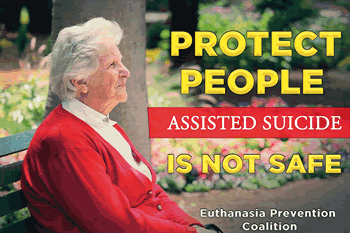Euthanasia – Dangerous Trends (2)

Debra Vermeer
The euthanasia situation in Belgium is similar to that in the Netherlands, where the figures for 2015, show a 41 per cent increase in euthanasia/assisted suicide deaths over the last four years.
In 2014-2015, nearly 4000 people underwent euthanasia in Belgium, of which 124 cases were justified on the basis of behavioural, mental or psychological disorders, rather than a terminal illness. Among the reasons given for euthanasia is that elderly patients were ‘tired of life’.
Last year, the first child was euthanised in Belgium after the law was amended to allow for this. In the Netherlands, some babies born with Spina Bifida had been euthanised.

Anti-euthanasia protest in Belgium, 2014
Leading Australian anti-euthanasia advocate, Paul Russell, says that the soaring numbers of euthanasia and assisted suicide cases in the Netherlands and Belgium and the expansion of the type of patient requesting euthanasia shows that those societies have grown used to the laws and no safe-guards will be effective in controlling it.
‘What I think this tells us is that the notion of a ‘slippery slope’ or ‘incremental extension’ is not just about later amendment of the original statute; even though that is also likely and the possibility of that is inherent in the enabling act. But it is also about interpretation and the reality that black-letter law is never going to be able to keep any legislation so tightly interpreted as to always reflect the original intentions,’ he says.
One of the jurisdictions most often cited by pro-euthanasia advocates is Oregon in the United States.

Paul Russell, Australian
anti-euthanasia advocate
Oregon’s Death with Dignity Act (DWDA), enacted in late 1997, allows terminally ill adult Oregonians to obtain and use prescriptions from their physicians for self-administered, lethal doses of medications. The Oregon Public Health Division is required by the Act to collect information on compliance and to issue an annual report.
But Professor Aaron Kheriaty, associate professor of psychiatry and director of the Medical Ethics Program at UC Irvine School of Medicine, says that there are serious problems with the laws in Oregon and many documented cases of abuse.
‘I have evaluated and treated thousands of patients who wanted to end their life,’ he wrote in an opinion piece which appeared in California’s The Mercury News.
‘A request to die is nearly always a cry for help. Among terminally ill individuals, it is associated with depression in 59 per cent of cases. Yet, alarmingly, in Oregon, less than five per cent of individuals who have died by assisted suicide were ever referred for psychiatric consultation to rule out the most common causes of suicidal thinking.’

Professor Aaron Kheriaty
Professor Kheriaty also identified the problem of ‘doctor shopping’, where if patients are refused access to assisted suicide by their doctor, they are in some cases directed by their managed care insurance company to another doctor who will prescribe the lethal drug.
‘In Oregon, a small number of physicians write a disproportionately large number of the prescriptions,’ he wrote.
‘Despite the inadequate system of monitoring and reporting in Oregon, the data we have paints a distressing picture. After suicide rates had declined in the 1990s, they rose dramatically in Oregon between 2000 and 2010, in the years following the legalisation of assisted suicide in 1997. By 2010, suicide rates were 35 per cent higher in Oregon than the national average.’
Returning to Canada recently to give a public address in the wake of the legalisation of ‘assisted dying’ there, Professor Somerville warned that a fundamental line had been crossed.
‘The case for euthanasia has been made by making it seem harmless, that it’s just a very small step along an end-of-life-care path we’ve already taken and accept as ethical,’ she said. ‘The intentional infliction of death has been trivialised in order to persuade Canadians to accept euthanasia, and many of them seem to have sleep-walked into doing so, that is, without understanding the full consequences of legalisation, for instance, the harm to important societal values and risks to vulnerable people.
‘Legalising euthanasia is not just an approval of another medical intervention, it’s a radical and seismic shift in foundational societal values, in particular, what is required if, as both individuals and a society, we are to continue to respect human life.’

 Entries(RSS)
Entries(RSS)